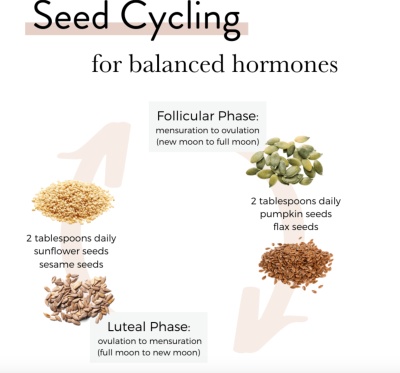
Seed cycling is a natural approach to support hormonal balance and menstrual health, using a combination of specific seeds and their nutrients. In this blog post, we will explore the science behind seed cycling and how to do it effectively.
Seed cycling is based on the idea that certain seeds contain specific
nutrients that can support different phases of the menstrual cycle. The
menstrual cycle is a complex interplay between hormones, including estrogen,
progesterone, follicle-stimulating hormone (FSH), and luteinizing hormone
(LH).
During the first half of the menstrual cycle, estrogen levels rise, leading to
the growth and maturation of the follicles in the ovaries. This phase is known
as the follicular phase, and it typically lasts from day 1 to day 14 of the
menstrual cycle. During this phase, consuming specific seeds can support the
production and metabolism of estrogen, which is essential for the maturation
of the follicles.
The seeds that are typically recommended during the follicular phase are
flaxseeds and pumpkin seeds. Flaxseeds are rich in lignans, which are
compounds that have a weak estrogenic effect and can bind to estrogen
receptors in the body. Pumpkin seeds, on the other hand, are rich in zinc,
which is essential for the production of FSH and LH.
During the second half of the menstrual cycle, progesterone levels rise,
leading to the thickening of the uterine lining in preparation for pregnancy.
This phase is known as the luteal phase, and it typically lasts from day 15 to
day 28 of the menstrual cycle. During this phase, consuming specific seeds can
support the production and metabolism of progesterone, which is essential for
the maintenance of the uterine lining.
The seeds that are typically recommended during the luteal phase are sesame
seeds and sunflower seeds. Sesame seeds are rich in lignans, which can support
the production and metabolism of progesterone. Sunflower seeds, on the other
hand, are rich in vitamin E, which is essential for the production and
metabolism of progesterone.
Seed cycling is a simple and inexpensive practice that can be easily incorporated into your daily routine. Here is a step-by-step guide on how to do seed cycling:
Identify your menstrual cycle: It's important to know your menstrual cycle length to determine which seeds to consume during each phase. If you have an irregular cycle, you can still follow the protocol by consuming the seeds alternately every two weeks.
Choose your seeds: As mentioned above, flaxseeds and pumpkin seeds are recommended during the follicular phase, while sesame seeds and sunflower seeds are recommended during the luteal phase. Make sure to choose organic, raw, and unprocessed seeds to maximize their nutrient content.
Incorporate the seeds into your diet: You can consume the seeds in a variety of ways, such as adding them to smoothies, salads, oatmeal, or yogurt. You can also grind them in a coffee grinder to make them easier to digest.
Consume the seeds daily: Aim to consume 1-2 tablespoons of each seed daily during each phase of your menstrual cycle. You can also adjust the amounts according to your personal preferences.
Be patient: Seed cycling is a natural approach that can take time to see results. Consistency is key, and it's important to stick with the practice for at least 3-6 months to see improvements in menstrual health.
Seed cycling is a natural and effective approach to support hormonal balance
and menstrual health. By incorporating specific seeds into your diet during
each phase of your menstrual cycle, you can support the production and
metabolism of estrogen and progesterone.
At One Agora, we utilize seed cycling with our clients in conjunction
with hormone balancing programs, acupuncture, and other herbs and
supplements.